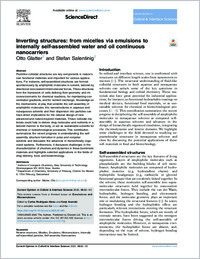Inverting structures: from micelles via emulsions to internally self-assembled water and oil continuous nanocarriers
- Glatter, Otto Institute of Inorganic Chemistry, Graz University of Technology, Stremayrgasse 9/V, 8010 Graz, Austria
- Salentinig, Stefan Department of Chemistry, University of Fribourg, Chemin Du Musée 9, 1700 Fribourg, Switzerland
-
01.10.2020
Published in:
- Current Opinion in Colloid & Interface Science. - 2020, vol. 49, p. 82–93
English
Fluid-like colloidal structures are key components in nature's own functional materials and important for various applications. For instance, self-assembled structures are formed spontaneously by amphiphilic molecules in solvent, tailored by directional noncovalent intermolecular forces. These structures form the framework of cells defining their geometry and microenvironments for chemical reactions, for maintaining concentration gradients, and for nutrient exchange. Knowledge on the mechanisms at play that underlie the self-assembly of amphiphilic molecules into nanostructures in aqueous and nonaqueous solvents and their dispersion into particles can have direct implications for the rational design of new advanced and nature-inspired materials. These colloidal materials could help to deliver drug molecules and nutrients in a tailored manner to the body, or act as sustainable solvents for chemical or biotechnological processes. This contribution summarizes the recent progress in understanding the self-assembly structure formation in polar and nonpolar solvents and discusses the advances in hierarchically organized systems. Furthermore, it discusses challenges in the characterization of structure and dynamics in these biomimetic materials and highlights selected applications in the fields of drug delivery, food, and biotechnology.
- Faculty
- Faculté des sciences et de médecine
- Department
- Département de Chimie
- Language
-
- English
- Classification
- Chemistry
- License
-
License undefined
- Identifiers
-
- RERO DOC 329763
- DOI 10.1016/j.cocis.2020.05.003
- Persistent URL
- https://folia.unifr.ch/unifr/documents/309213
Statistics
Document views: 119
File downloads:
- pdf: 469
